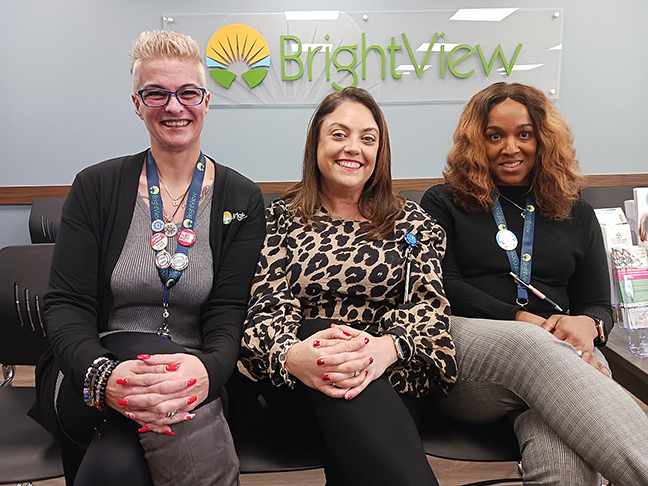Welcome!

The Brightview staff includes, from left, nurse practitioner Jennifer Curran, regional outreach director Tanya Smith and nurse practitioner Kirstie Ferrell. Larry Penkava/Randolph Hub
Brightview offers help for addictions
ASHEBORO — Overcoming addiction is hard work and can’t be fixed overnight. It takes accountability, structure and positive life goals.
Those are things an individual needs help with. Brightview is providing that help.
The comprehensive outpatient addiction treatment center opened Dec. 4 at 341 N. Fayetteville St., Asheboro. In less than three months, the facility has accepted more than 70 clients.
Tanya Smith, regional director of outreach, said counseling is critical to defeating addiction. “If they don’t want counseling, we’re not a good fit,” she said. “We do counseling to change habits and drug-seeking behaviors” while instilling “healthy life decisions. This all happens with counseling.”
Brightview was founded in 2015 by an emergency room physician in Cincinnati, Ohio. There are now 73 facilities nationwide treating some 28,000 patients per month. Asheboro is the second center in North Carolina with another five scheduled to open soon.
The Asheboro center has eight staff members on-site with other support professionals. Clients can walk in to ask for help from 5 a.m.-2 p.m. Monday-Friday and 8 a.m.-noon on Saturdays. But someone will answer the phone, 833-510-4357, at all hours, seven days a week.
Of those seeking help for addiction, Smith said, “They’re broken when they come through the door. We work to bring them back up.”
A potential client receives a complete physical, which includes a toxicology screen to get a baseline of their physical condition and drugs in the system. After a doctor’s examination, the client submits to counseling. Each time they come in, they must provide a toxicology screen through a urine sample.
Smith said a large percentage of those addicted have mental problems related to trauma, which can come from their home or social environment, their biological history or exposure to drugs.
An example is a person who has lost their job and found themselves homeless, which is traumatic in itself. The person will resort to do what it takes to survive, things he or she was raised not to believe is acceptable to society, leading to more trauma. The person wants the pain to stop and turns to drugs or alcohol.
About 60 percent of those with addictions also have mental health issues, Smith said. Brightview teams with mental health professionals, such as Daymark, to help with patients with severe problems.
Smith blames the nationwide homeless situation on the COVID-19 pandemic, when people lost their jobs and found themselves unable to support themselves. That is exacerbated by a housing shortage.
Those who come to Brightview for help are expected to show significant progress in 90 days. But they can continue to receive help and encouragement.
“It takes a lot to admit a problem, to say they need help and to ask for it,” Smith said. Some aren’t ready for outpatient help but are referred to an inpatient facility. Those ready for outpatient assistance are held accountable and led to find structured life goals.
“They still need the village,” Smith said. “We’re their family, somebody to walk their life with them. We help them put up boundaries and to know the triggers (that lead back to substance abuse). They always have Brightview to help them.”
The facility even has snacks for the patients, according to Smith. “It’s sometimes the only meal that day for them. We give prizes for achievements. We recognize their work every day for recovery. We put a plan into action and walk alongside them to keep them moving forward.”
Brightside has a pharmacy to provide medicines to offset the drugs. The facility does not give out illicit drugs or needles. Smith said the pharmacy is under strict monitoring by government agencies.
During treatment, a patient is provided food, shelter and clothing when necessary and gets help in finding a job or with probation and parole. Brightview partners with a number of organizations within the community, such as Keaton’s Place, which offers resources to clients and drives them to inpatient facilities.
Brightview also works with doctors, psychiatrists, dentists, cardiologists and primary care physicians, to name a few.
Smith describes a typical client: “In an active addiction, the person will give up everything for that one thing. In recovery, they give up that one thing to get everything else back.
“When in recovery, they’re focusing on living as a new creation as their best self,” she said. “It’s important we support that.”
Besides monitoring a client’s physical and mental well-being and providing individual counsel, Brightview offers group therapy. Those sessions are scheduled after 2 p.m.
Smith said the staff is working on a couple of projects that will involve the community:
— Project Safe Neighborhood is in collaboration with the district attorney and law enforcement.
— Recovery Friendly Workforce will be an effort to encourage employers to allow workers time off for addiction treatment.
She also plans to meet with the Randolph County Board of Commissioners “to let them know what we’re doing. We need their support and approval to make change. We need bridges instead of opposing sides.”
•••
The proof is in the numbers
Brightview statistics provide the following figures based on addiction counseling:
— After 90 days, patients decrease illicit substance use by an average of nearly 70 percent.
— Alcohol consumption decreases more than 50 percent after 90 days.
— Time spent in jail decreases by nearly 70 percent during the first 90 days.
— Within six months, unemployment decreases by more than 50 percent.
— In the first 90 days, patients experience a decrease in arrests of nearly 60 percent.
— Emergency room visits drop by one-third after three months and 50 percent after one year.
— Patients report a nearly 50 percent increase in engagement with regular medical providers after 90 days in treatment.
